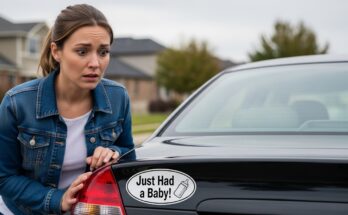I was seven months pregnant, broke, and barely holding it together. The baby’s father had walked out the night I told him. No argument, no hesitation—just “I’m not ready for this,” like fatherhood was a mountain he refused to climb. Since then, it was just me, the baby I called Bean, and my dying Toyota Corolla.
That Tuesday, I walked into the grocery store already defeated. I’d played the usual game: oatmeal over cereal, water over juice, skip the strawberries. I was down to my last $20, and every item in my cart felt like a gamble.
Then I saw him.
An old man at the register, maybe seventy-five, wearing a faded flannel and a knit cap pulled low. His hands trembled as he counted wrinkled bills. At his feet sat a terrier with a red bandana stitched with the name “Pippin.” The man’s basket held basics—milk, bread, soup—and two bags of dog food. But he didn’t have enough.
He kept asking the cashier to remove items. First the milk. Then the bread. The line behind him grew restless. A woman muttered about “wasting time.” A man groaned loudly. And then the old man whispered, “Just leave the dog food.”
That’s when I stepped forward. I didn’t think—I just handed over my last $20. “Please,” I said. “Let him keep everything.”
He looked at me like I’d handed him the moon. His eyes welled up. “Thank you,” he whispered. “Pippin thanks you too.”
I left the store lighter than I’d arrived. Not financially, but emotionally. I’d done something good. Something kind. Even if it meant skipping dinner myself.
The next morning, I opened my front door—and froze.
On my porch sat a basket. Inside were groceries: fresh fruit, bread, milk, even strawberries. Nestled among them was a note:
“You fed me when I couldn’t feed myself. You saw me when others looked away. I don’t have much, but I have enough to say thank you. —Walter & Pippin”
I cried. Not just because of the food, but because someone had seen me too. In a world that often feels cold and transactional, kindness had come full circle.
Later, I learned Walter was a retired teacher. He’d lost his wife two years ago and lived alone with Pippin. He’d been saving every penny for her vet bills. That day at the store, he’d been choosing between feeding himself or feeding her.
We stayed in touch. He became part of my village. When Bean was born, Walter was the first to hold her after me. And Pippin? She curled up beside the crib like she’d always belonged.
That $20 didn’t just buy groceries. It bought connection. It reminded me that even when you’re at your lowest, you can still lift someone else—and in doing so, lift yourself.
Kindness isn’t a transaction. It’s a legacy.


